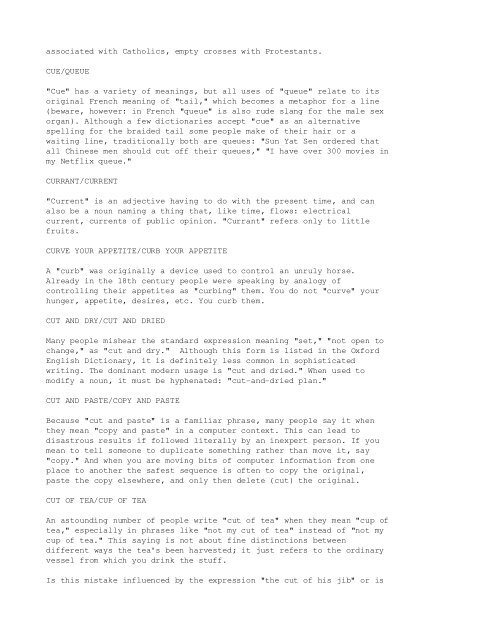Common_Errors_in_English_usage
Common_Errors_in_English_usage
Common_Errors_in_English_usage
Create successful ePaper yourself
Turn your PDF publications into a flip-book with our unique Google optimized e-Paper software.
associated with Catholics, empty crosses with Protestants.<br />
CUE/QUEUE<br />
"Cue" has a variety of mean<strong>in</strong>gs, but all uses of "queue" relate to its<br />
orig<strong>in</strong>al French mean<strong>in</strong>g of "tail," which becomes a metaphor for a l<strong>in</strong>e<br />
(beware, however: <strong>in</strong> French "queue" is also rude slang for the male sex<br />
organ). Although a few dictionaries accept "cue" as an alternative<br />
spell<strong>in</strong>g for the braided tail some people make of their hair or a<br />
wait<strong>in</strong>g l<strong>in</strong>e, traditionally both are queues: "Sun Yat Sen ordered that<br />
all Ch<strong>in</strong>ese men should cut off their queues," "I have over 300 movies <strong>in</strong><br />
my Netflix queue."<br />
CURRANT/CURRENT<br />
"Current" is an adjective hav<strong>in</strong>g to do with the present time, and can<br />
also be a noun nam<strong>in</strong>g a th<strong>in</strong>g that, like time, flows: electrical<br />
current, currents of public op<strong>in</strong>ion. "Currant" refers only to little<br />
fruits.<br />
CURVE YOUR APPETITE/CURB YOUR APPETITE<br />
A "curb" was orig<strong>in</strong>ally a device used to control an unruly horse.<br />
Already <strong>in</strong> the 18th century people were speak<strong>in</strong>g by analogy of<br />
controll<strong>in</strong>g their appetites as "curb<strong>in</strong>g" them. You do not "curve" your<br />
hunger, appetite, desires, etc. You curb them.<br />
CUT AND DRY/CUT AND DRIED<br />
Many people mishear the standard expression mean<strong>in</strong>g "set," "not open to<br />
change," as "cut and dry." Although this form is listed <strong>in</strong> the Oxford<br />
<strong>English</strong> Dictionary, it is def<strong>in</strong>itely less common <strong>in</strong> sophisticated<br />
writ<strong>in</strong>g. The dom<strong>in</strong>ant modern <strong>usage</strong> is "cut and dried." When used to<br />
modify a noun, it must be hyphenated: "cutanddried plan."<br />
CUT AND PASTE/COPY AND PASTE<br />
Because "cut and paste" is a familiar phrase, many people say it when<br />
they mean "copy and paste" <strong>in</strong> a computer context. This can lead to<br />
disastrous results if followed literally by an <strong>in</strong>expert person. If you<br />
mean to tell someone to duplicate someth<strong>in</strong>g rather than move it, say<br />
"copy." And when you are mov<strong>in</strong>g bits of computer <strong>in</strong>formation from one<br />
place to another the safest sequence is often to copy the orig<strong>in</strong>al,<br />
paste the copy elsewhere, and only then delete (cut) the orig<strong>in</strong>al.<br />
CUT OF TEA/CUP OF TEA<br />
An astound<strong>in</strong>g number of people write "cut of tea" when they mean "cup of<br />
tea," especially <strong>in</strong> phrases like "not my cut of tea" <strong>in</strong>stead of "not my<br />
cup of tea." This say<strong>in</strong>g is not about f<strong>in</strong>e dist<strong>in</strong>ctions between<br />
different ways the tea's been harvested; it just refers to the ord<strong>in</strong>ary<br />
vessel from which you dr<strong>in</strong>k the stuff.<br />
Is this mistake <strong>in</strong>fluenced by the expression "the cut of his jib" or is





